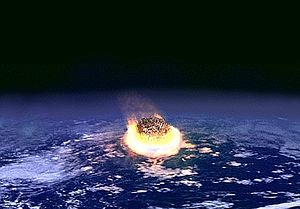So you think global warming is a big problem? What could happen if a 25-million-ton chunk of rock slammed into Earth?
When something similar happened 65 million years ago, the dinosaurs and other forms of life were wiped out.
“A collision with an object of this size traveling at an estimated 30,000 to 40,000 mile per hour would be catastrophic,” according to NASA researcher and New York City College of Technology (City Tech) Associate Professor of Physics Gregory L. Matloff. His recommendation? “Either destroy the object or alter its trajectory.”
Dr. Matloff, whose research includes the best means to avert such a disaster, believes that diverting such objects is the wisest course of action. In 2029 and 2036, the asteroid Apophis (named after the Egyptian god of darkness and the void), at least 1,100 feet in diameter, 90 stories tall, and weighing an estimated 25 million tons, will make two close passes by Earth at a distance of about 22,600 miles.
“We don’t always know this far ahead of time that they’re coming,” Dr. Matloff says, “but an Apophis impact is very unlikely.” If the asteroid did hit Earth, NASA estimates, it would strike with 68,000 times the force of the atom bomb that leveled Hiroshima. A possibility also exists that when Apophis passes in 2029, heating as it approaches the sun, it could fragment or emit a tail, which would act like a rocket, unpredictably changing its course. If Apophis or its remnants enter one of two “keyholes” in space, impact might happen when it returns in 2036.
Large chunks of space debris whizzing by the planet, called Near-Earth Objects (NEOs), are of real concern. NASA defines NEOs as comets and asteroids that enter Earth’s neighborhood because the gravitational attraction of nearby planets affects their orbits. Dr. Matloff favors diverting rather than exploding them because the latter could create another problem — debris might bathe Earth in a radioactive shower.









